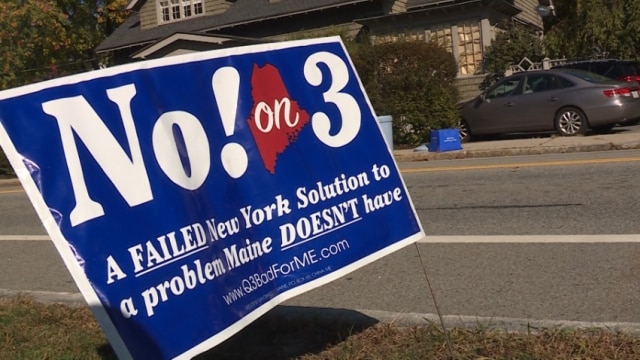
Maine’s ballot measure on guns had a bigger turnout than the presidential election (Photo: WMTW.com)
Maine was the only state that saw an anti-gun voter referendum defeated in last year’s election cycle and lawmakers want to keep similar proposals off the ballot.
A measure, LD 1411, proposed by state Sen. Eric Brakey, R-Androscoggin, on Tuesday would amend the Maine Constitution and create a process that would prevent unconstitutional ballot measures from reaching voters.
“The constitutional rights of Maine people should never be subject to a majority rule process,” Brakey said in a statement. “We have a constitutional system just for that purpose: to protect the constitutional rights of Maine people from the whims of the moment.”
Last year a ballot initiative backed by national gun control groups, Question 3, sought to expand background checks to all gun transfers in the state. After paying a professional canvassing organization based in Washington, D.C.to come into the state and collect signatures, the effort made the ballot with the help of $5 million in funding largely made available by Bloomberg groups but was rejected at the polls.
The ballot referendum was a hot topic with Maine voters, who cast more ballots on Question 3 than they did to decide the presidential race. Meanwhile, voter initiatives in three other states passed, some by a landslide.
Within days of the referendum’s defeat, Republican Gov. Paul LePage — a vocal opponent of Question 3 — proposed to amend the state constitution on citizen’s initiatives to make a repeat attempt more complicated. LePage suggested that signatures collected for referendum be gathered proportionately across each of the state’s counties, noting that much of the support for the measure came from a handful of heavily canvassed urban centers.
Brakey’s bill shifts away from that premise by allowing the state’s governor, attorney general, legislature or any group of 500 citizens to formally request an opinion on the proposition from Maine’s Supreme Court should they feel the proposal is unconstitutional. If the high court finds it incompatible and agrees with the challenge, Maine’s Secretary of State would be forced to reject the initiative.
“As outside special interests increasingly seek to exploit our state’s referendum process, this legislation would establish that our fundamental rights as Maine people are not up for vote,” said Brakey.
His bill has been referred to the Committee on Veterans and Legal Affairs.
The post Maine pushes to make it harder for voter initiatives to succeed appeared first on Guns.com.
